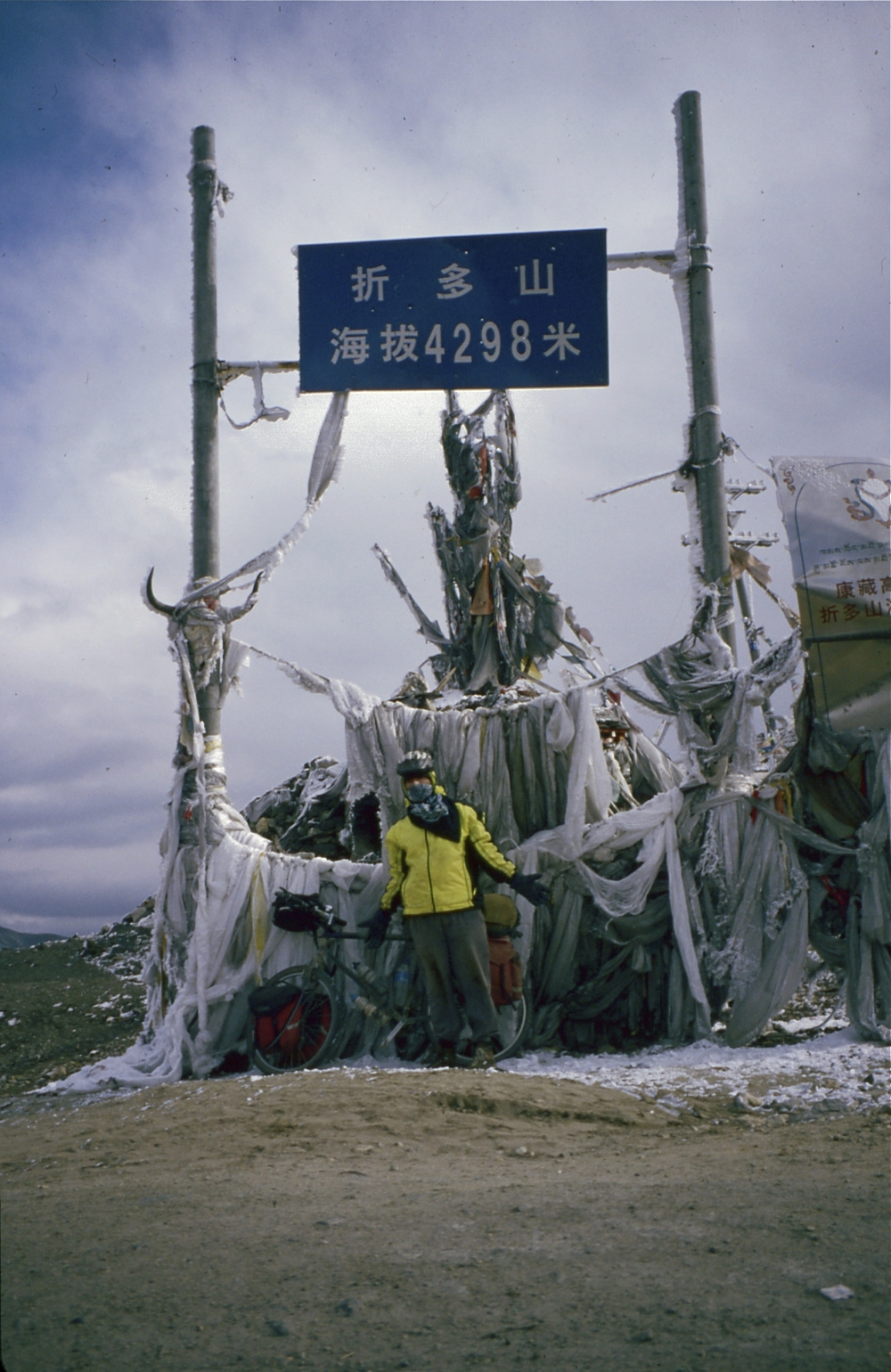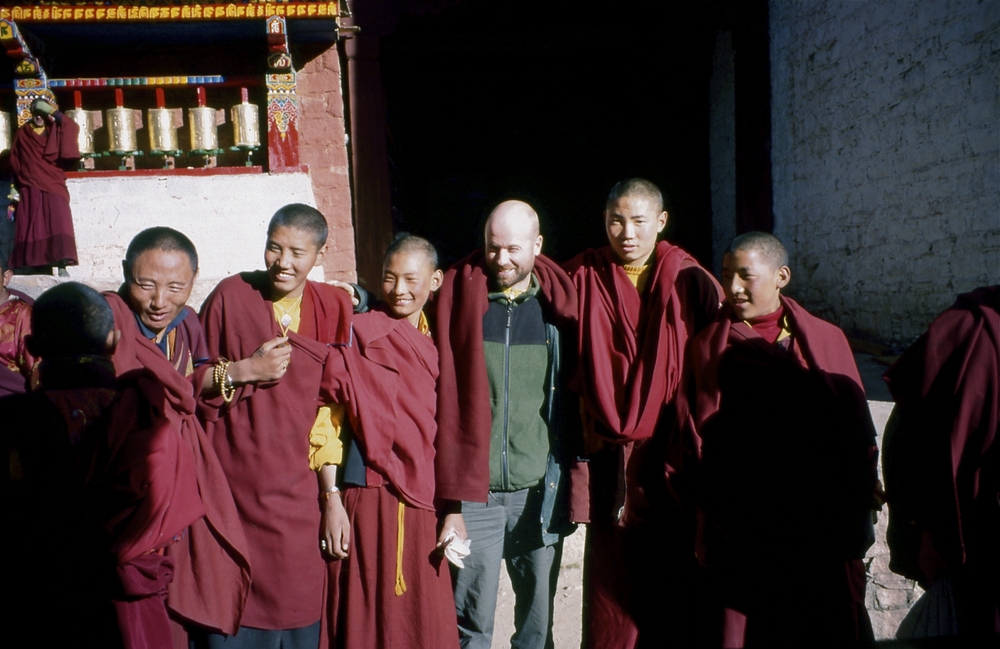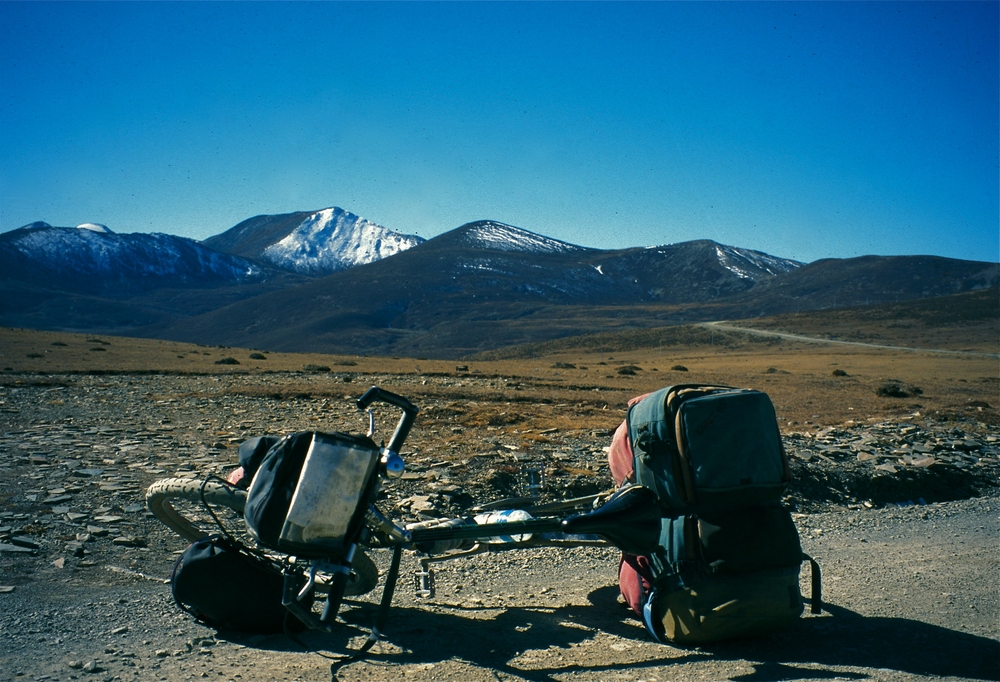Bombay to Beijing by Bicycle (29 page)
Read Bombay to Beijing by Bicycle Online
Authors: Russell McGilton

Not easily dissuaded, the mechanic made a steel plate around the torn eyelets and welded a bolt to the steel forks. For an hour’s work and less than two dollars, the problem was solved.
‘You are a God!’ I exclaimed, almost genuflecting.
He blew smoke from his fag, walked over to a bus axel with his welding gun, bent over and unwittingly exposed the cleft of his bum.
November

On a cold mountain pass flapping with prayer flags, I stopped, took off my shoes and massaged my feet. I couldn’t feel them anymore and they looked like they had been mummified. A van whizzed past and skidded to a halt. An overweight man with a white beard jumped out, ran up to me, then whipped out his camera and madly clicked away.
‘You are at 4298 metres!’ he exclaimed in a sharp German accent, and shoved an altimeter in my face.
‘Oh, hey—’
‘I am doing a book on ze source of ze Yangtze River. Last I did ze Yunnan Province. Goodbye.’
He shook my hand, then ran back to the van, jumped in and sped off.
I had only cycled 11 kilometres that morning, most of it uphill, and I was freezing my head off. The day before, I had cycled 54 kilometres of undulating roads from Xiangcheng through endless pine forests that gave way to rocky barren hills. I had stayed the night in a road-workers’ hut (quite a large one), where the husband and wife fed me up on noodles and beef as we sat in the light of a small fire.
In the middle of the night, I desperately needed to relieve myself. I couldn’t find the toilets and as my hosts had gone to bed I decided to relieve myself outside. Just as I was about to squat I heard a savage growl. I turned round to see the guard dog running towards me from the other end of the yard. I leapt up and ran to the door, when there was a yelp. The dog had reached the end of its tether, so to speak. Its barking woke up my host who didn’t look pleased at all when he saw me with my pants half down.
I was neither well nor in the best of spirits. I was tired, and I looked it. Filth crept into everything in a Tibetan, ground-in way. Why wash, the Tibetan logic seemed to be, when you’re likely to get ill?
The only compensation was a brilliant blue clear sky, making the mountains look as if they had been cookie-cut. Soon I was in Santway, some 85 kilometres north of my drunken night with Jason, and ended the day in a room above a Tibetan restaurant. The room was clean, timbered and very comfortable, though no one would have thought that when looking at the restaurant itself. It was walled with newspaper to keep the draught from cutting through the gaps of slatted timber. I dozed off, snoozing under a pink duvet that smelt of rancid yak butter, embedded from hundreds of yawning Tibetan breaths.
Santway had a Wild West feeling about it. The streets were wide, unsealed and raw, and dust devils whirled around the skirts of both Tibetan grandmothers and young, broad-smiling monks. As I sat in a restaurant and watched men swagger in, some in wide-brimmed hats, I waited for the sound of spurs and the spectacle of a bar fight. Other locals wore fur hats and big coats, and stood outside looking at me and at my bike while kids bounced bottles off the tyres.
The owner brought me a large bowl of stew comprised of potatoes, meat and strange herbs the shape of sun wheels. As I ate, I was suddenly struck with cramps. I asked for the toilets and they waved me to a shed way out back. I squatted down on two boards over a hole and relieved myself when I heard a din of squeals. I looked down. I was above a pigpen! They didn’t sound too happy. How could they be? I never ate pork in China again. ‘Hey, waiter, this pork tastes like –’
But it would be my baldness that opened up a new experience for me. Passing oblong stone houses with jutting carved beams and multi-coloured window frames, I arrived at three white
stupas
about a kilometre from town. A cacophony of drums and horns flurrying and blasting away suddenly caught my attention. Nestled at the foothills of a mountain I noticed a small Tibetan monastery. I followed the sound and snuck in and stood behind a pillar observing young monks sitting down and chanting over aged scriptures while older monks sat on platforms near tall yellow candles.
For all its formality, the scene had a very relaxed air about it. Monks drank their butter tea, hacked off chunks of cheese and nibbled at round loaves of bread as if they were reading the sports pages in a tabloid.
Catching sight of me, an older monk walked over, and I expected to be escorted out. But instead, he took off his maroon robe and put it around my shoulders, then offered me a seat by the horn players. I sat down. He pointed to my bald head and gave it the thumbs–up, as did the younger monks sitting next to me, smiling and laughing.
One of the young monks offered me a five-foot-long silver horn to play, intimating that he would let me know when I had to blow. But it seemed fairly obvious: whenever the drums were beaten in a quick frenzy, the horns followed suit, a blast of noise.
The monks gave me the cue. Now, they didn’t know that I played the trumpet for four years as a teenager, so I wasn’t just going to give them the same fluff they were doing. Oh, no! I was going to set this place on fire! (Probably not the best thing to say to monks à la Cultural Revolution). I let it rip and out came something that was supposed sound upbeat – ‘Oh, When The Saints’ – but ended up sounding like a yak rolling down a ravine. The monks snapped around, mouths wide.
Oh, shit! Have I made some terrible faux pas?
Thankfully, they all burst out laughing.
Ah, Buddhism. What a way cool relig–
A young monk next to me snatched the trumpet from me and collapsed it like a telescope. Perhaps I really had upset some people. But no, prayers were now over and everyone was leaving. Soon the monks gathered around me and outside we took photographs, arms round each other’s shoulders, laughing and smiling. They then ushered me into a small kitchen and plied me with butter tea (which tasted not unlike my own urine) just to make sure that I would never come back and mess up their trumpet playing again!
I’m joking of course. They were wonderful and despite not being able to speak each other’s language, we smiled, nodded, laughed and simply enjoyed each other’s company. It had been a gift to meet these wonderful monks.

As I walked back up the dusty road toward Santway, I stopped and looked back. Tibetan women washed their clothes in the afternoon light while their filthy children played, one running off with the empty Sprite bottle from my jacket pocket. On a beam hanging from the monastery a
mandala
billowed in the breeze, while an old Tibetan couple pushed a giant prayer wheel. It had been a glorious day.
As night fell, and back at the restaurant, I couldn’t help myself: I had to teach a Tibetan truck driver to ‘James Brown’, like I had with Lanarge and Manarge in India. The truck driver picked up the moves immediately, shaking and twisting his hips and yelling ‘HEY-YYYY!’ as he played to the audience – a smiling woman, her husband with hat and bung eye, their eight-year-old daughter, the cook, and a sweet 15-year-old hotel assistant with a long plaits and rosy cheeks.
The room was filled with laughter. How happy everyone seemed, sitting by the fire, effortlessly chatting and drinking tea.
Just as everyone was feeling cosy like one big, happy family, the generator was cranked up, the video-CD player was switched on, and the moment stopped. Kids fell to the floor, cheekbones slouched on fists, eyes glazed over and mouths yawned open as an ultra-violent Hong Kong film tore down the warm curtain of comfort.
I went off to bed, feeling alone yet again.
***
Out of Santway, I set off with eight boiled eggs (trying to get them boiled was a mission – the cook nearly fried them in their shells in a big wok). The terrain was littered with boulders and large stones, and small pine trees clung to the steep slopes. Shrubs had stopped growing by the edge of the approaching pass, frightened off by the sheets of frigid air screaming up the valley. Ice, in the permanent shadows of the mountain, bled icicles like old men’s beards.

I spent the day on the nude hills. There was absolutely nothing out here, and the sense of total isolation and loneliness seemed all too real, so empty, that sometimes I would stop and scream, just to confirm that I existed. Other times I burst into tears, frightened by my own insignificance amongst the towering mountains (actually, it might’ve been also that I saw numerous large climbs ahead of me!).
Traffic was rare except for a convoy of squat People’s Liberation Army tanker trucks, 50 or so, filing past, leaving me with their diesel breath. I saw this convoy nearly every day; when I beat them to small towns they cheered, and when they beat me up the long inclines … they cheered even louder!
By late afternoon I was struggling up a five kilometre pass, a tail wind freezing my arse off. I stopped and let my body sink over the handlebars, the will to keep going smashed on the barren rocky landscape. I got off and pushed. When I did eventually get to the pass, I saw, to my delight, a road descending into the valley below. At the end of it was a small town, Litang.
I flew down the road, my bike smacking heavily in protest under the weight of my luggage. I popped over irregular bumps, stones and tarred lumps, and nearly lost everything when the road dropped into a huge trough. The land had given way to heavy rain and, instead of
re-levelling
the road, road builders had simply re-tarred it. It was like riding into a roller-coaster dip and the bike shot into the air. We landed hard but then I had to immediately slam on the brakes as an overloaded truck whipped around a switchback on the wrong side of the road. I threw the bike along an embankment, missing the truck by inches.
After recovering, I took another turn, the free-hub screaming as the bike hit 70 kilometres on the odometer. On a downward straight I came face to face with a police car dozily climbing up the hill. I wondered whether I should stop but then I thought at this speed, by the time they turn around, I’ll be in another province.
I put my head down; the bar grips howling like a dive-bombing Stuka; the police car was in my sights.
WHOOOOOOOOOOOOOSH!
I flared past the police car’s windscreen, leaving both officers with their mouths wide open like carnival circus clowns. I looked back. They had stopped, but then with a jolt, kept going.
After an hour of this bouncing madness, I had to stop and shake my wrists out from the pain of squeezing the brake levers. I leant over and touched the sidewall of the rim. It was red hot. I got off and checked the pads. I had already gone through two front pads on this trip and, because of an uneven adjustment, had dished the rim on the front wheel. I gave the pads a quick tweak and continued on.
Beyond the tree-lined hills, I could see Litang in the distance, fed by an open, brown, lonely road. It was arid; I could not see crops of any sort, only yaks dotting the vastness.
Litang was a dusty old town with wide streets – another Santway but with more people and one of China’s highest towns at 4014 metres (even higher than Lhasa). Chinese business abounded, lured by financial incentives to resettle here. I was the only foreigner among rough-and-ready-looking men sporting leather jackets, long hair and silver daggers around their waists as they swaggered down the streets. I was in what was once known as Kham (the Chinese renamed it Sichuan). Not surprisingly, the people here were called Khambas, a sub-group of nomadic Tibetans that inhabited the highland plateau from the foothills of Sichuan to the high altitudes of Lhasa. Unrivalled in horsemanship, the Khambas had for over a thousand years maintained a reputation as fearsome warriors, fighting other clans, robbing settlements and trade caravans. Lastly, they had a 17-year war against the People’s Liberation Army.
